Find Help
More Items From Ergsy search
-

What is Bowel Cancer?
Relevance: 100%
-

Can bowel cancer be prevented?
Relevance: 95%
-

How common is bowel cancer?
Relevance: 95%
-

How is bowel cancer diagnosed?
Relevance: 95%
-

What are the risk factors for bowel cancer?
Relevance: 93%
-

What is the survival rate for bowel cancer?
Relevance: 92%
-

Bowel cancer - Symptoms and signs to look out for
Relevance: 90%
-

How is the stage of bowel cancer determined?
Relevance: 89%
-

What treatment options are available for bowel cancer?
Relevance: 88%
-

Bowel Cancer
Relevance: 88%
-

Can bowel cancer spread to other parts of the body?
Relevance: 86%
-

How to do the FIT bowel cancer screening test | Cancer Research UK
Relevance: 86%
-

What are the side effects of bowel cancer treatment?
Relevance: 85%
-

Taking a Genetic Family History - The Conversation (Bowel Cancer)
Relevance: 85%
-

What support is available for individuals diagnosed with bowel cancer?
Relevance: 85%
-
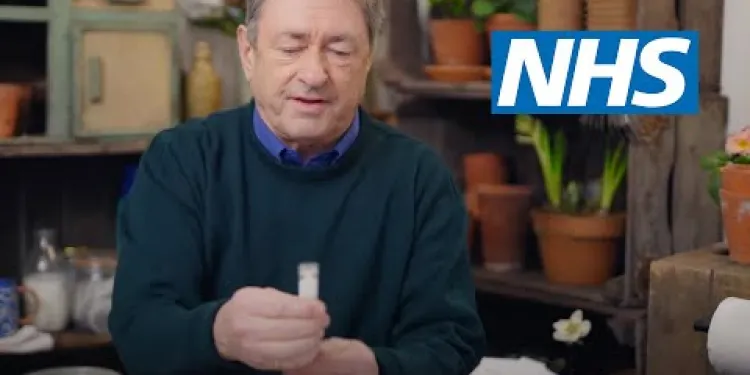
Bowel cancer screening: Alan Titchmarsh and Tommy Walsh | NHS
Relevance: 84%
-

Learn about bowel cancer (British Sign Language version)
Relevance: 84%
-
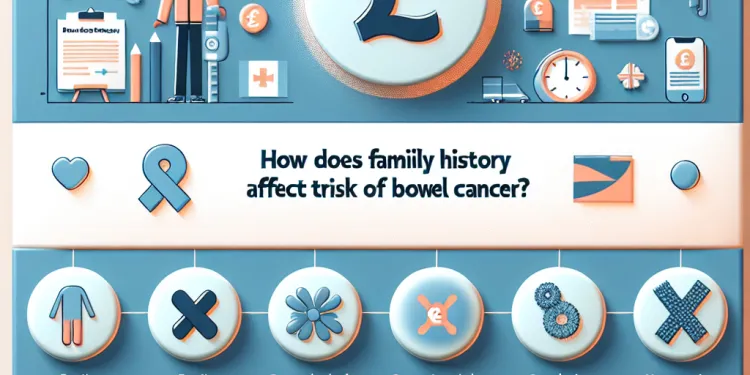
How does family history affect the risk of bowel cancer?
Relevance: 84%
-

What role does diet play in the risk of developing bowel cancer?
Relevance: 83%
-

What lifestyle changes can help lower the risk of bowel cancer?
Relevance: 82%
-
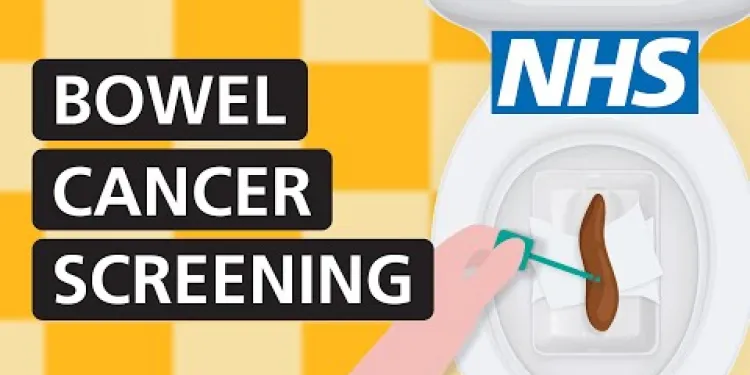
How to use the bowel cancer screening FIT kit | NHS
Relevance: 67%
-

What is the difference between colon cancer and rectal cancer?
Relevance: 66%
-

What is colorectal cancer?
Relevance: 58%
-

Ovarian cancer - signs and symptoms to look out for
Relevance: 57%
-
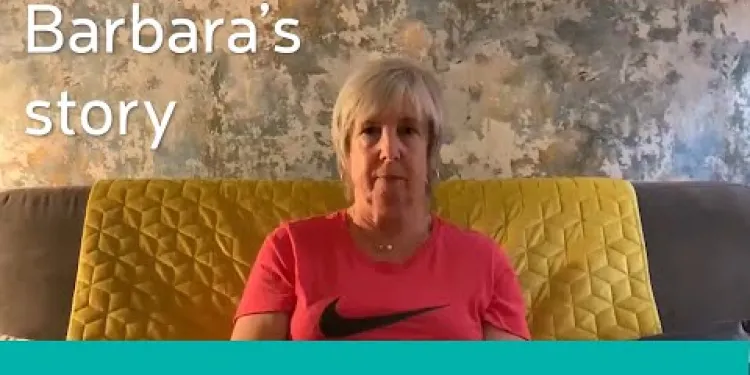
Bowel Cancer
Relevance: 55%
-

Bowel Cancer
Relevance: 55%
-

Bowel Cancer
Relevance: 55%
-

Bowel Cancer
Relevance: 55%
-

Bowel Cancer
Relevance: 55%
-

Bowel Cancer
Relevance: 55%
-

Bowel Cancer
Relevance: 55%
-

Bowel Cancer
Relevance: 55%
-

Bowel Cancer
Relevance: 55%
-

Bowel Cancer
Relevance: 55%
-

Bowel Cancer
Relevance: 55%
-

Bowel Cancer
Relevance: 55%
-

Bowel Cancer
Relevance: 55%
-
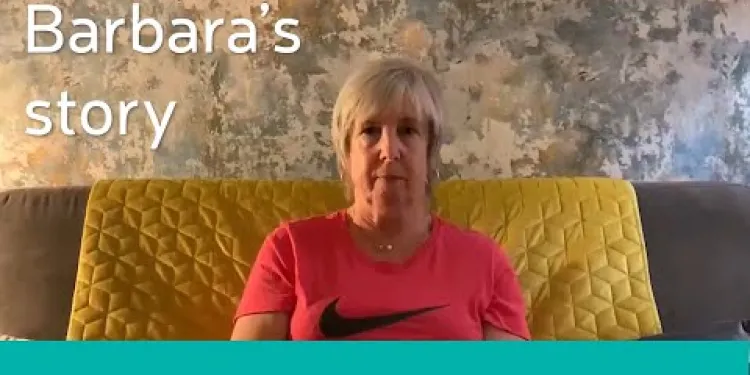
Bowel Cancer
Relevance: 55%
-

What is irritable bowel syndrome (IBS)?
Relevance: 53%
-

Diagnosing irritable bowel syndrome (IBS)
Relevance: 52%
How Phil Changes His Stoma Bag
Preparing the Supplies
Phil starts by gathering all the necessary supplies to change his stoma bag. This often includes a new stoma bag, adhesive removal wipes, stoma cleansing wipes, barrier spray, and disposal bags. He makes sure his hands are clean and, if necessary, wears disposable gloves to maintain hygiene. Having the materials ready aids in a smooth and efficient process.
Removing the Old Stoma Bag
To remove the old stoma bag, Phil gently peels it away from his skin, using adhesive removal wipes to ease the process and reduce discomfort. He then cleans the area around the stoma using stoma cleansing wipes to remove any residue. Ensuring the skin is clean and dry before applying a new bag is crucial to avoid irritation.
Preparing the Skin Around the Stoma
Phil uses a barrier spray to protect the skin around the stoma, providing a protective layer that helps prevent irritation. He allows the barrier spray to dry completely before proceeding. This step ensures that the skin is prepared to hold the new stoma bag securely without causing skin issues.
Applying the New Stoma Bag
Phil carefully aligns the new stoma bag's opening over his stoma and presses it firmly in place. He ensures there are no air bubbles under the adhesive and that the bag is securely attached. Proper placement and attachment are vital to prevent leaks and ensure comfort.
Disposing of the Used Supplies
Once the new stoma bag is securely in place, Phil disposes of the old bag and used wipes in a disposal bag. He ties the disposal bag securely before placing it in the household rubbish. Responsible disposal of used supplies is important to maintain hygiene and avoid unpleasant odors.
Regular Maintenance and Checks
Phil regularly checks the condition of the stoma bag and the health of his skin around the stoma. By staying vigilant, he can address any issues promptly, ensuring ongoing comfort and preventing complications. Routine maintenance helps Phil manage his stoma effectively.
How Phil Changes His Stoma Bag
Getting Ready
Phil collects everything he needs to change his stoma bag. He gets a new stoma bag, wipes to remove the old bag, cleaning wipes for the stoma, barrier spray, and bags to throw things away. Phil washes his hands first and may wear gloves to keep everything clean. Having everything ready makes it easier.
Taking Off the Old Stoma Bag
Phil takes off the old stoma bag gently. He uses wipes to help take it off without hurting his skin. After taking it off, he cleans the skin around the stoma with wipes. It is important to keep the skin clean and dry to stop it from getting irritated.
Getting the Skin Ready
Phil sprays the skin around the stoma with a special spray. This helps protect the skin and stops it from getting sore. He waits for the spray to dry before putting on the new bag. This keeps the bag attached well without hurting his skin.
Putting On the New Stoma Bag
Phil puts the new stoma bag carefully over the stoma. He presses it down so it sticks well. He makes sure there are no air bubbles and that it stays on tight. This helps stop leaks and makes it more comfortable.
Throwing Away Used Supplies
After the new stoma bag is on, Phil throws away the old bag and wipes. He uses a special bag to throw them away and ties it up before putting it in the trash. Throwing away things properly keeps everything clean and free from bad smells.
Checking and Caring
Phil often checks his stoma bag and the skin around it. If he sees any problems, he can fix them quickly. Checking makes sure he is comfortable and the stoma is healthy. Taking care of the stoma helps Phil live happily.
Frequently Asked Questions
What is a stoma bag?
A stoma bag is a medical device used to collect waste from the body after certain surgeries. It attaches to a stoma, an opening created surgically on the abdomen.
How often should I change my stoma bag?
You should typically change your stoma bag every 3 to 7 days, though this can vary based on the type of bag and personal circumstances.
What supplies do I need to change my stoma bag?
You will need a new stoma bag, adhesive remover, skin barrier wipes, warm water, clean towels, and disposal bags.
How do I prepare the area before changing the stoma bag?
Wash your hands thoroughly with warm water and soap, then gather all necessary supplies within easy reach.
Can I eat or drink before changing my stoma bag?
Yes, but it is generally recommended to change your stoma bag when your stoma is less active, typically a few hours after meals.
How do I remove the old stoma bag?
Carefully peel the adhesive from your skin, using adhesive remover if necessary. Dispose of the old bag in a sealed disposal bag.
How should I clean the stoma area?
Use warm water and a clean cloth or wipe to gently clean around the stoma. Avoid using soaps with perfumes or lotions.
What should I do if the skin around my stoma is irritated?
Use skin barrier wipes to protect irritated skin. If irritation persists, consult your healthcare provider.
How do I apply the new stoma bag?
Make sure the skin around your stoma is dry. Peel off the backing from the new bag and carefully place it over the stoma, smoothing out any wrinkles.
How can I ensure a good seal with my stoma bag?
Press down firmly around the adhesive border to ensure a good seal and minimize leaks. Using a barrier ring can also help improve the seal.
What should I do if my stoma bag leaks?
Remove the leaky bag, clean the area, and apply a new bag. Check for any skin irritation and make adjustments to ensure a better fit.
Can I shower or swim with my stoma bag?
Yes, you can shower or swim with your stoma bag. Most bags are waterproof, but you might want to use additional waterproof covers for extra security.
How do I manage odours from my stoma bag?
Ensure a good seal to prevent leaks, and consider using odour-reducing drops or tablets specifically designed for stoma bags.
How often should I check my stoma bag?
Check your stoma bag regularly throughout the day to see if it needs emptying or changing. This helps prevent leaks and skin irritation.
Can I use any adhesive with my stoma bag?
It's important to use adhesives and accessories designed for stoma care to avoid skin irritation and ensure a secure fit.
What is a stoma bag?
A stoma bag is a special bag. It catches pee or poo that comes out of a small opening on your belly. This opening is called a stoma.
Sometimes, people need a stoma bag after a sick tummy or an operation.
Here are some tools that can help you learn more:
- Ask a nurse or doctor. They can tell you how it works.
- Watch a video made for kids. It can show how to use a stoma bag.
- Read a book or story about using a stoma bag.
A stoma bag is a special bag used after some operations to collect waste from the body. It connects to a stoma, which is a hole made by doctors on the tummy.
How often should I change my stoma bag?
You need to change your stoma bag when it is about halfway full. This is usually every day or every other day. It depends on how much you eat and drink.
Ask your nurse or doctor. They can help you find out what is best for you.
Use a mirror to see better when changing the bag.
Write down the days you change your bag. This can help you remember.
You should change your stoma bag every 3 to 7 days. But sometimes, you might need to do it more or less often. It depends on the type of bag you use and your own needs.
What things do I need to change my stoma bag?
Here are the things you need:
- A new stoma bag
- Stoma wipes or wet wipes
- Scissors (if your stoma bag needs cutting to size)
- Waste bag for the old stoma bag
- Stoma powder or barrier cream (if needed)
Helpful tips:
- Ask someone to help you if you find it hard.
- Use a mirror to see better when changing the bag.
Remember to wash your hands before and after.
You will need a new stoma bag, stuff to take off the sticky part, skin wipes, warm water, clean towels, and bags to throw things away.
How do I get ready to change the stoma bag?
1. Make a clean space:
- Find a table or flat space.
- Make sure it is clean and dry.
2. Wash your hands:
- Use soap and water.
- Dry your hands well.
3. Get your supplies:
- Stoma bag
- Wipes or tissues
- Scissors (if you need them)
Tip: Ask an adult for help if you need it.
Wash your hands well with warm water and soap. Make sure you have everything you need close by.
Can I eat or drink before I change my stoma bag?
Here is some simple advice to help you:
- Before you change your stoma bag, it is okay to have a small drink, like water or tea.
- Try not to eat a big meal right before changing the bag. Eating a little snack is okay.
- If you are not sure, ask a nurse or doctor.
Remember, it is always good to be calm and relaxed when you change your stoma bag. You can use a mirror to see better. You can also listen to nice music to help you relax.
Yes, but it's best to change your stoma bag when your stoma is not working a lot. This is usually a few hours after you eat.
How can I take off the old stoma bag?
Here is an easy way to take off your old stoma bag:
- Wash your hands with soap and water.
- Stand or sit in front of a mirror.
- Gently peel the bag away from your skin. Start at the top and move downwards.
- Use a damp cloth or special wipes to clean your skin if needed.
- Throw the old bag in the garbage.
- Wash your hands again.
Tools that might help:
- Special wipes for cleaning your skin.
- Hand mirror for better view.
- Soap and water or hand sanitizer.
If you need help, ask a nurse or someone you trust.
Gently take the sticky part off your skin. You can use a special liquid to help if needed. Throw the old bag away in a sealed trash bag.
How can I clean around the stoma?
Here is how to clean around a stoma:
- Wash your hands first. This helps keep everything clean.
- Use warm water and a soft cloth to clean around the stoma.
- Be gentle when cleaning. The skin can be delicate.
- Dry the area well by patting it with a towel.
- If your doctor gave you special instructions, follow them too.
If you find it hard to remember these steps, you can write them down or ask someone to help you.
Use warm water and a clean cloth or wipe to gently clean around the stoma. Do not use soaps with strong smells or lotions.
What can I do if the skin near my stoma is sore?
If the skin around your stoma is red or itchy, try these steps:
- Gently clean the area with warm water and a soft cloth. Do not scrub hard.
- Make sure the skin is dry before putting on a new stoma bag.
- Check if the stoma bag fits well. It should not be too tight or loose.
- Use a skin barrier cream if needed.
- Try not to use soaps or creams with strong smells as they can hurt your skin.
- Ask a nurse or doctor if the soreness does not go away.
Here are some tools to help you:
- Magnifying glass: Helps to see the area better.
- Alarms: Set a reminder to change your stoma bag regularly.
- Timer: Use a timer to ensure your cleaning routine is consistent.
Use special wipes to help protect sore skin. If your skin still hurts, talk to your doctor or nurse.
How can I put on the new stoma bag?
Keep the skin around your stoma dry. Take off the sticky part from the new bag. Gently put the bag over the stoma. Make sure there are no bumps.
How can I make sure my stoma bag is on properly?
A stoma bag is a special bag that collects waste from your body. It is important that it sticks well to your skin. This helps it stay in place and stops leaks.
Here are some tips to help you:
- Make sure your skin is clean and dry before you put the bag on.
- Try using a special paste or ring to fill in any gaps between the bag and your skin.
- Press the bag onto your skin gently but firmly to stick it well.
- Check the bag often to make sure it's not loose or leaking.
- Ask a nurse or doctor for help if you are not sure.
Using a mirror can help you see what you are doing. There are also videos online that show you how to put on a stoma bag.
Press down hard on the sticky edge. This helps to stop any leaks. You can also use a barrier ring. This can make the seal better.
What to Do if Your Stoma Bag Leaks?
If your stoma bag leaks, don’t worry. Here are some simple steps you can follow:
- Try to stay calm. Take deep breaths to help you feel better.
- Change your stoma bag. Get a clean bag and put it on.
- Clean the skin around the stoma with warm water and a soft cloth. Pat it dry gently.
- If you can, ask someone to help you.
- Check that the bag is on properly.
- If it keeps leaking, talk to your nurse or doctor.
Here are some tools that might help you:
- Stoma paste: This can help seal the bag better.
- Barrier cream: To protect your skin.
Remember, it's okay to ask for help!
Take off the leaky bag. Clean the skin around it. Put on a new bag. Look for red or sore skin. Make the bag fit better if needed.
Can I shower or swim with my stoma bag?
Yes, you can shower or swim with your stoma bag. Here are some tips to help you:
- Make sure the bag is attached properly before you start.
- Check if the bag is waterproof.
- You can use special covers to protect the bag if you want.
- Ask a nurse for advice if you are not sure.
Remember to take your time and be gentle with your stoma bag. You can always ask for help if you need it.
Yes, you can take a shower or swim with your stoma bag on. Most bags are made to be okay with water. You might want to use extra covers that keep water out to feel safer.
How can I stop smells from my stoma bag?
A stoma bag can sometimes have a smell. Here are some simple tips to help:
- Change the bag often so it stays clean.
- Use special sprays or drops to stop smells. You can buy these at the pharmacy.
- Eat foods that help reduce smells, like yoghurt.
- Avoid foods that make smells worse, like onions and beans.
- Talk to your doctor or nurse for more help.
You can also use apps or videos to learn more about your stoma bag and how to take care of it.
Make sure the bag is closed tight so nothing spills out. You can also use special drops or tablets to help stop bad smells from the stoma bag.
When should I look at my stoma bag?
Your stoma bag needs checking to make sure it is okay. You should look at it:
- In the morning when you wake up.
- Before and after you eat.
- Before you go to sleep.
- If you feel it is full or if it leaks.
You can use a clock or set reminders on your phone to help you remember.
Look at your stoma bag many times during the day. See if it needs emptying or changing. This stops leaks and keeps your skin healthy.
Can I use any glue with my stoma bag?
A stoma bag needs special glue to stick safely to your skin. Always check with a doctor or nurse before using different glue. They can help you choose the right one.
Support tools can help too. You can use pictures to show how to stick the bag. Also, a reminder list can make sure you do each step in the right way.
It is important to use special sticky products made for stoma care. This helps keep your skin safe and makes sure everything fits right.
Useful Links
Useful links from: Bowel cancer - Symptoms and signs to look out for
- NHS - Bowel Cancer This page from the NHS provides comprehensive information on bowel cancer, including symptoms, causes, diagnosis, treatment, and prevention.
- Cancer Research UK - Bowel Cancer Symptoms Cancer Research UK's page on bowel cancer symptoms details the various signs and symptoms to look out for, as well as information on early detection and when to see a doctor.
- Bowel Cancer UK - Symptoms Bowel Cancer UK's overview of symptoms provides important insights into the early warning signs of bowel cancer, along with advice on when to seek medical advice.
- Macmillan Cancer Support - Bowel Cancer Symptoms Macmillan Cancer Support offers a detailed guide on the symptoms of bowel cancer, emphasizing how to recognize the signs and understanding the importance of early diagnosis.
Useful links from: Bowel Cancer
- NHS North East London - Barbara’s Story Barbara’s Story is an educational resource used by NHS North East London to promote awareness about the experiences of vulnerable patients, particularly those with dementia, in healthcare settings.
- Alzheimer's Society UK - Barbara's Story in Dementia Education The Alzheimer’s Society uses Barbara’s Story as a key training tool to enhance understanding and empathy towards people with dementia, ensuring their voices and needs are better heard in medical care.
- Age UK - Barbara's Story: Enhancing Patient Experience Age UK includes Barbara's Story as part of its training resources, aimed at improving the quality of care for elderly patients, with a special focus on those suffering from cognitive impairments.
- Dementia UK - Learning Through the Lens of Barbara’s Story Dementia UK provides Barbara’s Story as a training video to healthcare professionals, to help develop a more empathetic understanding of the challenges faced by people living with dementia.
Useful links from: Taking a Genetic Family History - The Conversation (Bowel Cancer)
- NHS - Family History of Bowel Cancer This NHS page provides information on the causes of bowel cancer, including genetic factors and family history. It offers insights into hereditary risks and screening recommendations.
- Cancer Research UK - Bowel Cancer and Family History Cancer Research UK highlights the different risk factors for bowel cancer, focusing on genetic predispositions and the importance of family history in understanding individual risk levels.
- Bowel Cancer UK - Genetic Conditions Bowel Cancer UK provides detailed information on genetic conditions associated with a higher risk of developing bowel cancer. It offers resources for those with a family history and advice on genetic testing.
- Macmillan Cancer Support - Bowel Cancer Risk Factors Macmillan Cancer Support discusses the various risk factors for bowel cancer, with a focus on how family history and genetics can influence an individual's risk and the importance of early detection.
Useful links from: Bowel Cancer
- NHS - Mental Health Services Information about the mental health services provided by the NHS, including how to access them and what support is available.
- Mind - Mental Health Charity A UK-based charity offering advice and support to anyone experiencing a mental health problem.
- Rethink Mental Illness A charity that supports people who are affected by mental illness through advocacy, advice, and information.
- Samaritans - Providing Emotional Support A UK charity offering emotional support 24/7 to anyone who is dealing with distress or mental health issues.
Useful links from: Bowel Cancer
- National Health Service (NHS) The NHS website provides information and advice on a wide range of health and care topics. You can find NHS services, check your symptoms, find out about treatments, and read health news and articles.
- Mind UK Mind is a mental health charity offering advice and support to anyone experiencing a mental health problem. They provide a range of resources including information on mental health conditions, where to get help, and ways to support others.
- Samaritans Samaritans is a charity dedicated to reducing feelings of isolation and disconnection that can lead to suicide. They offer 24/7 support to anyone in need, through a helpline, email, or face-to-face services.
- Rethink Mental Illness Rethink Mental Illness is a charity that aims to improve the lives of people severely affected by mental illness through local groups, expert advice, information, and campaigning for policy change.
Useful links from: Bowel Cancer
- NHS - Mental health and wellbeing The NHS provides a comprehensive guide on mental health conditions, including information on symptoms, treatments, and how to get help.
- Mind - For better mental health Mind is a UK-based charity offering advice and support to empower anyone experiencing a mental health problem. They campaign to improve services, raise awareness, and promote understanding.
- Rethink Mental Illness Rethink Mental Illness provides support and information for people affected by mental illness. They offer services and support groups, as well as campaigning for better mental health services.
- YoungMinds YoungMinds is a charity dedicated to children and young people's mental health. They offer resources for young people, parents, and professionals, and campaign for better mental health support.
Useful links from: Bowel Cancer
- NHS - Cervical Screening Information on cervical screening, who should have it, and how it is done from the National Health Service.
- Jo's Cervical Cancer Trust UK charity dedicated to women affected by cervical cancer and cervical abnormalities, offering support and information.
- NHS - Cancer Comprehensive resource about cancer, including types, symptoms, diagnosis, and treatments from the NHS.
- Macmillan Cancer Support A leading UK charity providing support to cancer patients and their families throughout diagnosis, treatment, and beyond.
Useful links from: Bowel Cancer
- NHS - People Who Can Help This NHS page offers a list of mental health helplines and services for urgent support in the UK, which may be beneficial for individuals facing similar challenges as Wynne.
- Mind - For Better Mental Health Mind is a UK-based charity providing advice and support to empower anyone experiencing a mental health problem. They campaign to improve services, raise awareness and promote understanding.
- Rethink Mental Illness Rethink Mental Illness provides expert advice and information to everyone affected by mental health problems. They offer extensive resources that can help individuals like Wynne cope with their conditions.
- Samaritans - Emotional Support Samaritans is a charity that provides confidential emotional support to those experiencing distress or despair. Their services could be a vital resource for anyone in need of urgent emotional assistance.
Useful links from: Bowel Cancer
- NHS - Mental Health and Wellbeing The NHS provides comprehensive information and support for mental health and wellbeing, including symptoms, treatments, and advice on managing stress, anxiety, and depression.
- Mind - Mental Health Charity Mind is a UK-based charity that offers advice and support to empower anyone experiencing a mental health problem. They also campaign to improve services, raise awareness, and promote understanding.
- Rethink Mental Illness Rethink Mental Illness is a charity that provides expert, accredited advice and information to everyone affected by mental health issues. They offer a wide range of support services, including helplines, support groups, and resources.
- Samaritans Samaritans is a UK charity that offers emotional support to anyone in distress, struggling to cope, or at risk of suicide. Their helpline is available 24/7 to provide confidential support.
Useful links from: Bowel Cancer
- NHS: Mental Health Services This NHS page provides comprehensive information on accessing mental health services, including where to get help and what types of services are available.
- Mind: Mental Health Support Mind is a UK charity offering advice and support to empower anyone experiencing a mental health problem. It also campaigns to improve services, raise awareness, and promote understanding.
- Samaritans: Emotional Support Samaritans is a UK charity offering confidential emotional support to anyone in distress or struggling to cope, available 24/7 via their helpline.
- Rethink Mental Illness Rethink Mental Illness is a UK charity that provides expert, accredited advice and information to everyone affected by mental health problems, supporting recovery and improving the lives of those with mental illness.
Useful links from: Bowel Cancer
- NHS Mental Health and Wellbeing Comprehensive resource for mental health and wellbeing, providing information on conditions, treatments, and where to get help.
- Mind - For Better Mental Health UK charity offering information and support for people experiencing mental health problems. Provides advice, helplines, and local services.
- Samaritans A UK charity dedicated to reducing feelings of isolation and disconnection that can lead to suicide. Offers 24/7 support through their hotline.
- Rethink Mental Illness Provides information, services, and a strong voice for everyone affected by mental illness, challenging attitudes, and changing lives.
Useful links from: Bowel Cancer
- NHS: Mental health services - Where to get urgent help for mental health Provides information on how to get urgent help for mental health problems, including contact details and what to do in a mental health crisis.
- Mind: Paul's Story A personal account of Paul's experiences with mental health challenges, offering insights and hope for others facing similar issues.
- Samaritans: How we can help Offers emotional support to anyone in distress or struggling to cope, 24 hours a day, 365 days a year.
- Rethink Mental Illness: Our personal experiences Contains personal accounts from individuals living with mental illness, aiming to raise awareness and reduce stigma.
Useful links from: Bowel Cancer
- NHS - Mental Health Information and support for mental health issues provided by the NHS, including resources for managing conditions and accessing services.
- Mind Mind is a UK-based charity that offers advice and support to empower anyone experiencing a mental health problem. It also campaigns to improve services, raise awareness, and promote understanding.
- Rethink Mental Illness Rethink Mental Illness helps millions of people affected by mental illness by providing expert, accredited advice and information, tailored support, and campaigning for change.
- Samaritans Samaritans provides emotional support to anyone in emotional distress, struggling to cope, or at risk of suicide throughout the United Kingdom and Ireland.
Useful links from: Bowel Cancer
- NHS - Mental Health and Wellbeing Official NHS resource for mental health, including a range of support services, self-help guides, and advice on managing mental wellbeing.
- Mind - Mental Health Charity Leading UK mental health charity offering information, advice, and resources to help those experiencing mental health issues. Provides support groups and an extensive library of information.
- Rethink Mental Illness Provides expert, accredited advice and information to everyone affected by mental health problems. Focuses on severe mental illnesses and offers support, services, and advice.
- Samaritans A confidential emotional support service for anyone in the UK and Ireland. Available 24/7 through various means including phone, email, and face-to-face.
Useful links from: Danny's Story
- NHS - Danny's Story Learn about Danny’s Story on the NHS website, which highlights the journey and experiences of individuals with autism.
- National Autistic Society - Real Stories Explore Danny’s story on the National Autistic Society’s website, focusing on real-life accounts of people on the autism spectrum.
- Mind - Stories and Experiences Read about Danny’s experience with mental health on the Mind charity website, offering support and insights for those affected.
- YoungMinds - Mental Health Stories Find Danny’s story on the YoungMinds website, which shares the personal journeys of young people dealing with mental health challenges.
Useful links from: Bowel Cancer
- NHS - Barbara's Story An overview of Barbara's Story, which is an initiative aimed at educating healthcare professionals on the effects of dementia through a series of video narratives.
- Alzheimer's Society - Barbara’s Story and Dementia Training Information provided by the Alzheimer's Society on Barbara's Story, including its use in dementia training to improve understanding and empathy among healthcare staff.
- King’s Health Partners - Barbara's Story King’s Health Partners' page on Barbara's Story, detailing its significance and the impact it has had on dementia care and training within the NHS.
- Dementia UK - Barbara’s Story Dementia UK’s resources on Barbara's Story, exploring how the narrative approach is used to enhance the care of people with dementia and support their families.
Useful links from: Dr Philippa Kaye's story
- NHS - Health A-Z Comprehensive guide to conditions, symptoms, and treatments provided by the NHS.
- Macmillan Cancer Support UK charity offering support and information to those affected by cancer.
- Cancer Research UK UK-based cancer research and awareness charity, providing detailed information on cancer types, symptoms, and treatments.
- Mind UK Leading mental health charity in the UK providing advice and support to empower anyone experiencing a mental health problem.
- Ergsy carfully checks the information in the videos we provide here.
- Videos shown by Youtube after a video has completed, have NOT been reviewed by ERGSY.
- To view, click the arrow in centre of video.
- Most of the videos you find here will have subtitles and/or closed captions available.
- You may need to turn these on, and choose your preferred language.
- Go to the video you'd like to watch.
- If closed captions (CC) are available, settings will be visible on the bottom right of the video player.
- To turn on Captions, click settings .
- To turn off Captions, click settings again.
More Items From Ergsy search
-

What is Bowel Cancer?
Relevance: 100%
-

Can bowel cancer be prevented?
Relevance: 95%
-

How common is bowel cancer?
Relevance: 95%
-

How is bowel cancer diagnosed?
Relevance: 95%
-

What are the risk factors for bowel cancer?
Relevance: 93%
-

What is the survival rate for bowel cancer?
Relevance: 92%
-

Bowel cancer - Symptoms and signs to look out for
Relevance: 90%
-

How is the stage of bowel cancer determined?
Relevance: 89%
-

What treatment options are available for bowel cancer?
Relevance: 88%
-

Bowel Cancer
Relevance: 88%
-

Can bowel cancer spread to other parts of the body?
Relevance: 86%
-

How to do the FIT bowel cancer screening test | Cancer Research UK
Relevance: 86%
-

What are the side effects of bowel cancer treatment?
Relevance: 85%
-

Taking a Genetic Family History - The Conversation (Bowel Cancer)
Relevance: 85%
-

What support is available for individuals diagnosed with bowel cancer?
Relevance: 85%
-

Bowel cancer screening: Alan Titchmarsh and Tommy Walsh | NHS
Relevance: 84%
-

Learn about bowel cancer (British Sign Language version)
Relevance: 84%
-

How does family history affect the risk of bowel cancer?
Relevance: 84%
-

What role does diet play in the risk of developing bowel cancer?
Relevance: 83%
-

What lifestyle changes can help lower the risk of bowel cancer?
Relevance: 82%
-

How to use the bowel cancer screening FIT kit | NHS
Relevance: 67%
-

What is the difference between colon cancer and rectal cancer?
Relevance: 66%
-

What is colorectal cancer?
Relevance: 58%
-

Ovarian cancer - signs and symptoms to look out for
Relevance: 57%
-

Bowel Cancer
Relevance: 55%
-

Bowel Cancer
Relevance: 55%
-

Bowel Cancer
Relevance: 55%
-

Bowel Cancer
Relevance: 55%
-

Bowel Cancer
Relevance: 55%
-

Bowel Cancer
Relevance: 55%
-

Bowel Cancer
Relevance: 55%
-

Bowel Cancer
Relevance: 55%
-

Bowel Cancer
Relevance: 55%
-

Bowel Cancer
Relevance: 55%
-

Bowel Cancer
Relevance: 55%
-

Bowel Cancer
Relevance: 55%
-

Bowel Cancer
Relevance: 55%
-

Bowel Cancer
Relevance: 55%
-

What is irritable bowel syndrome (IBS)?
Relevance: 53%
-

Diagnosing irritable bowel syndrome (IBS)
Relevance: 52%